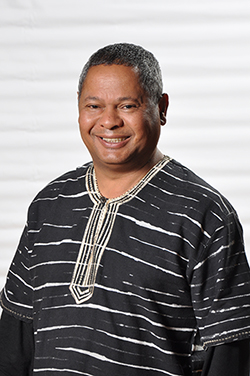Latest News Archive
Please select Category, Year, and then Month to display items
09 November 2018
|
Story Charlene Stanley
|
Photo Charlene Stanley
 Dr Tseliso Ntili, HOD of the Free State Department of Water and Sanitation, warns that pollution caused by mismanagement of municipal water-treatment works puts severe pressure on the province’s water security.
Dr Tseliso Ntili, HOD of the Free State Department of Water and Sanitation, warns that pollution caused by mismanagement of municipal water-treatment works puts severe pressure on the province’s water security.
“Despite our water challenges, Bloemfontein will never become a second Cape Town.” This firm assurance was given by Dr Tseliso Ntili, HOD of the Free State Department of Water and Sanitation, during his presentation at the recent regional seminar of the Faculty of Law’s Environmental Law Association.
The theme of the seminar was Water Quality and Water Security in Bloemfontein and was attended by staff and students from the Faculty of Law and the Faculty of Natural and Agricultural Sciences, as well as relevant role players from private, business, and government sectors.
Not enough water for city’s needs
Water restrictions in some form do seem to remain part of our future landscape though, as Dr Ntsili explained that the city’s current water yield of 218 megalitres per day still fell short of the demand of 259 megalitres per day.
Pollution and mismanagement at municipal level
He pointed out that a big cause for concern was that 75% of the Free State’s waste-water treatment works were dysfunctional. Housekeeping and security at these plants are often severely neglected. Yet, it is difficult for the Department of Water and Sanitation to act against offending municipalities.
“In intra-governmental disputes, the courts must be satisfied that organs of state have taken all reasonable steps to settle contentions – which can be a time-consuming process,” he explained.
Dr Ntsili said that the Caledon River System’s dwindling water levels due to low rainfall and siltation was also a concern, but that plans were underway to supplement the water supply to Bloemfontein via the Gariep Dam by 2026.
However, he warned that poor water management could drastically affect these long-term plans.
“If we can’t manage pollution, the cost will be high. Water security will be challenged, and we will have water shortages – not because of drought, but because of negligence.”
Prof Andre Keet to chair Ministerial Oversight Committee on Transformation
2017-07-14

Prof Andre Keet
Photo: Stephen Collet
Higher Education Minister Dr Blade Nzimande has increased from seven to 10 the number of members of the Ministerial Oversight Committee on the Transformation in the South African Public Universities.
In a government gazette published on 7 July 2017‚ Dr Nzimande appointed new members of the committee for a three-year term to be chaired by Prof Andre Keet, Director of the Institute for Reconciliation and Social Justice at the University of the Free State (UFS). Prof Keet is a returning member of the committee alongside former University of Fort Hare chancellor Dr Mvuyo Tom.
The purpose of the Ministerial Oversight Committee on Transformation in South African Public Universities is to monitor progress on transformation in public universities‚ serve as an expert advisory body and provide independent and external advice to the minister and the department.
The committee has been given 11 tasks‚ chief of which is to study and evaluate transformation plans and charters of all universities. It is mandated to use this exercise as a basis for the development of a sectoral transformation charter. It is also tasked with reviewing the annual reports of institutions on transformation and producing an annual report on the state of transformation in the higher education sector.
Prof Keet’s appointment comes at a pivotal time when transformation at universities has been at the heart of many debates in universities, government and broader society. Prof Keet said: “It is an honour and privilege to serve the sector at this level and in this capacity.”
The university is proud to have in its ranks a leader of such calibre who has also spearheaded transformation initiatives at the UFS through the Institute for Reconciliation and Social Justice over the past six years.